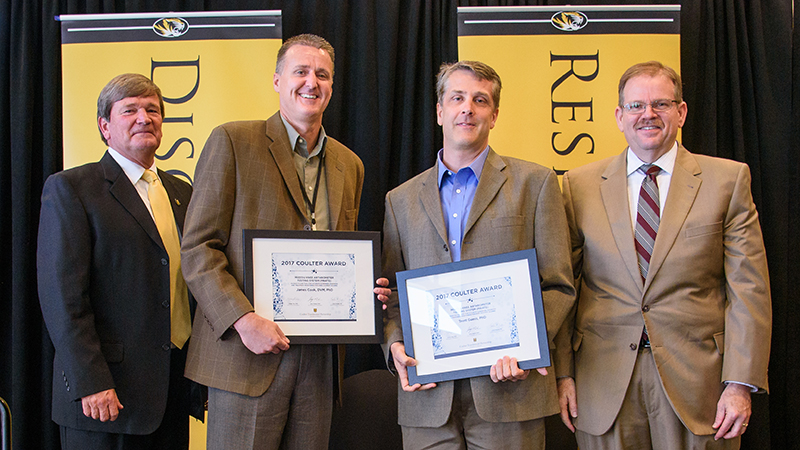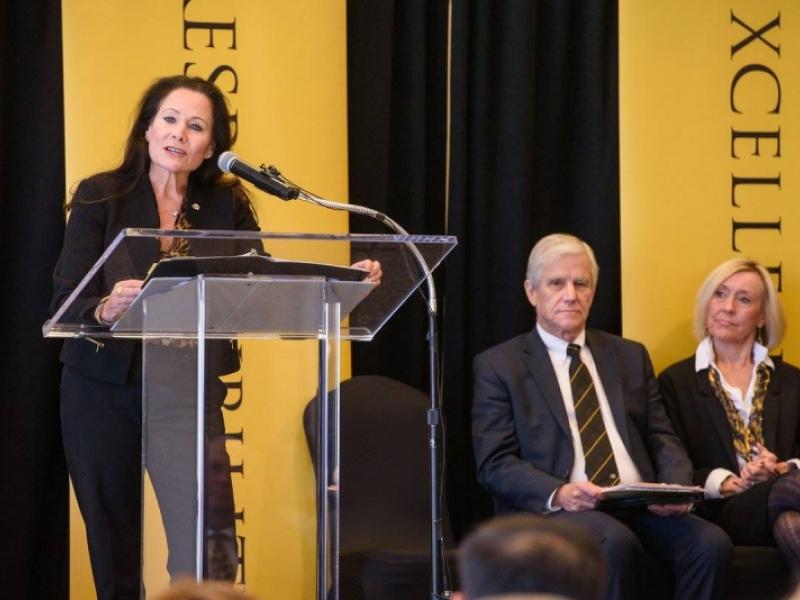
The University of Missouri’s Coulter Biomedical Accelerator Program today awarded five grants totaling $409,000 to help promising medical discoveries make the transition from laboratory research to commercial investment and direct patient care.
“The Coulter Biomedical Accelerator Program is truly a testament to the depth and breadth of collaborative research performed at the University of Missouri,” said Alexander Cartwright, chancellor of the University of Missouri. “It brings our experts in engineering, medicine and business together to deliver practical solutions to real medical problems to advance the health of Missourians, the nation and the world.”
The MU Coulter Biomedical Accelerator Program began in 2012 as a five-year partnership with the Wallace H. Coulter Foundation. Although the partnership with the Coulter Foundation ended in 2017, leaders at MU decided to extend the program for five more years with a combination of university funding, grants and gifts.
The five interdisciplinary research teams that received grants this year include faculty members from the MU College of Engineering and the MU School of Medicine. The grants will fund research projects including:
- The development of an easy-to-use tool to screen, diagnose and monitor the treatment of knee ligament injuries
- A new artificial hip joint that reduces the risk of dislocation
- A way to use 3D imaging to diagnose precancerous lesions on the cervix during a colposcopy
“At MU, we are known for working across disciplines to solve complex problems and make important discoveries,” said Patrick Delafontaine, M.D., Hugh E. and Sarah Stephenson Dean of the MU School of Medicine. “With more than 1,000 biomedical scientists and engineers — all on one campus — efforts such as the Coulter Biomedical Accelerator program position MU to transform ideas and discoveries into products, services and solutions that can dramatically improve patients’ lives.”
MU’s Coulter Biomedical Accelerator program provides annual awards to researchers whose projects demonstrate great scientific potential and meet a well-defined health care need. The projects are reviewed by a committee that includes entrepreneurs, accomplished researchers and venture capital investors.
“The MU Coulter Biomedical Accelerator Program is a shining example of what an institution such as ours can do with a collaborative atmosphere and the proper resources,” said Elizabeth Loboa, Ph.D., dean of the College of Engineering at the University of Missouri. “MU is one of only six public institutions nationwide that can claim a medical school, a veterinary medicine college, a business school and a law school on the same campus. Having such a robust, expert faculty across our schools and colleges promotes biomedical innovation in ways that cannot be achieved elsewhere.”
MU is one of only 16 academic institutions in the country and the only university in Missouri offering a Coulter Biomedical Accelerator Program. The 2017 Coulter Biomedical Accelerator program awards were given to five teams with a total of 10 researchers to fund the following projects:
BioJoint Flex: A Simple Solution for Stiff Knees: Jimi Cook, D.V.M., Ph.D., O.T.S.C., the William & Kathryn Allen Distinguished Chair in Orthopaedic Surgery, director of the Thompson Laboratory for Regenerative Orthopaedics, the Mizzou BioJoint® Center and chief of the Division of Orthopaedic Research at the Missouri Orthopaedic Institute, and Trent Guess, Ph.D., associate professor in the Department of Physical Therapy and Orthopaedic Surgery and director of the Mizzou Motion Analysis Center, have developed a non-invasive device that assists in controlled, supported and measured knee flexion or bending exercises. This device is designed to safely and effectively improve knee flexion and overall knee range of motion as part of a non-operative or pre-/post-operative rehabilitation program in physical therapy clinics, facilities and homes. With the BioJoint Flex, patients can reduce the need for repeat surgery, treat refractory loss of motion (arthrofibrosis) and improve their outcomes.
Mizzou Knee Arthrometer Testing System (MKATS): An Easy-to-Use tool for Accurate Screening, Diagnosis and Treatment Monitoring for Knee Ligament Injuries: Cook and Guess are developing a new way to assess the instability, or laxity, of healing knee ligaments. While devices that measure knee laxity have been commercially available for decades, MKATS can potentially address limitations of existing devices by delivering cost-effective quantitative measurement of knee laxity. Knee laxity is a known risk factor for ACL injury. Assessing this risk with the MKATS would help millions of amateur, collegiate and professional athletes by providing critical decision-making information to physical therapy clinics and athletic training facilities.
Natur-O-Lock: Keyed, Lock-In Acetabular Component for Prevention of Dislocation in Total Hip Replacement: Sonny Bal, M.D., J.D., M.B.A, an orthopaedic surgeon at the Missouri Orthopaedic Institute and Mohamed Rahaman, Ph.D., professor emeritus in the Department of Materials Science and Engineering at Missouri University of Science and Technology, are developing a new artificial hip socket that reduces the risk of hip dislocation. The socket, called the Natur-O-Lock system, potentially provides an innovative and simple hip socket that gives intrinsic stability to the ball-and-socket joint, thus preventing the problem of dislocation.
OPT-Enhanced Colposcopy: 3D Detection of Precancerous and Cancerous Lesions for Image-guided Biopsy: Mark Hunter, M.D., assistant professor and director of the Division of Gynecologic Oncology at MU Health Care and Gary Yao, Ph.D., director of Graduate Studies in Bioengineering at MU, are developing a new way to identify precancerous lesions on the cervix. The proposed optical polarization tractography-enhanced colposcopy is a new imaging system based on OPT technology. This technology makes it possible to accurately and objectively identify precancerous cervical lesions, as well as invasive cancerous lesions, during a colposcopy procedure. OPT-enhanced colposcopy could potentially allow clinicians to precisely detect lesions, perform image‐guided therapy and verify treatment outcomes in a single colposcopy session.
Tongue Twister: Mobile Health App for Early Detection and Monitoring of Tongue Dysfunction Caused by Neurological Disorders: Teresa Lever, Ph.D., assistant professor of otolaryngology at the MU School of Medicine; Mili Kuruvilla-Dugdale, Ph.D., assistant professor of communication science and disorders in the School of Health Professions at MU; Filiz Bunyak, Ph.D., assistant research professor in the Department of Computer Science at MU and Yunxin Zhao, Ph.D., professor in the Department of Computer Science at MU are developing a mobile app to help detect and monitor tongue dysfunction caused by disorders such as stroke, Parkinson’s disease, ALS and multiple sclerosis. Tongue Twister provides a low-cost, easy-to-use software solution that transforms widely used tongue performance tasks into real-time objective data. That data enables earlier and more accurate detection and treatment of tongue dysfunction and better analysis of treatment outcomes.
Since its inception, the Coulter Biomedical Accelerator program has helped MU research projects generate more than $13.5 million in new government grants and has led to the creation of multiple startup companies. To date, these companies have raised more than $2 million from early-stage investors. Additionally, the program has had four “Coulter wins” including two start-ups that have each raised more than $500,000. Another two Coulter technologies have been successfully licensed to established companies that are continuing commercialization of the technology.
“The awards we announced today are designed to bridge the funding gap for promising research projects that have excellent market potential but require more investment to advance through the research and business process,” said Cynthia Helphingstine, director of MU’s Coulter Biomedical Accelerator program. “Our Coulter Biomedical Accelerator program is a perfect example of the power of interdisciplinary collaborations at MU.”






